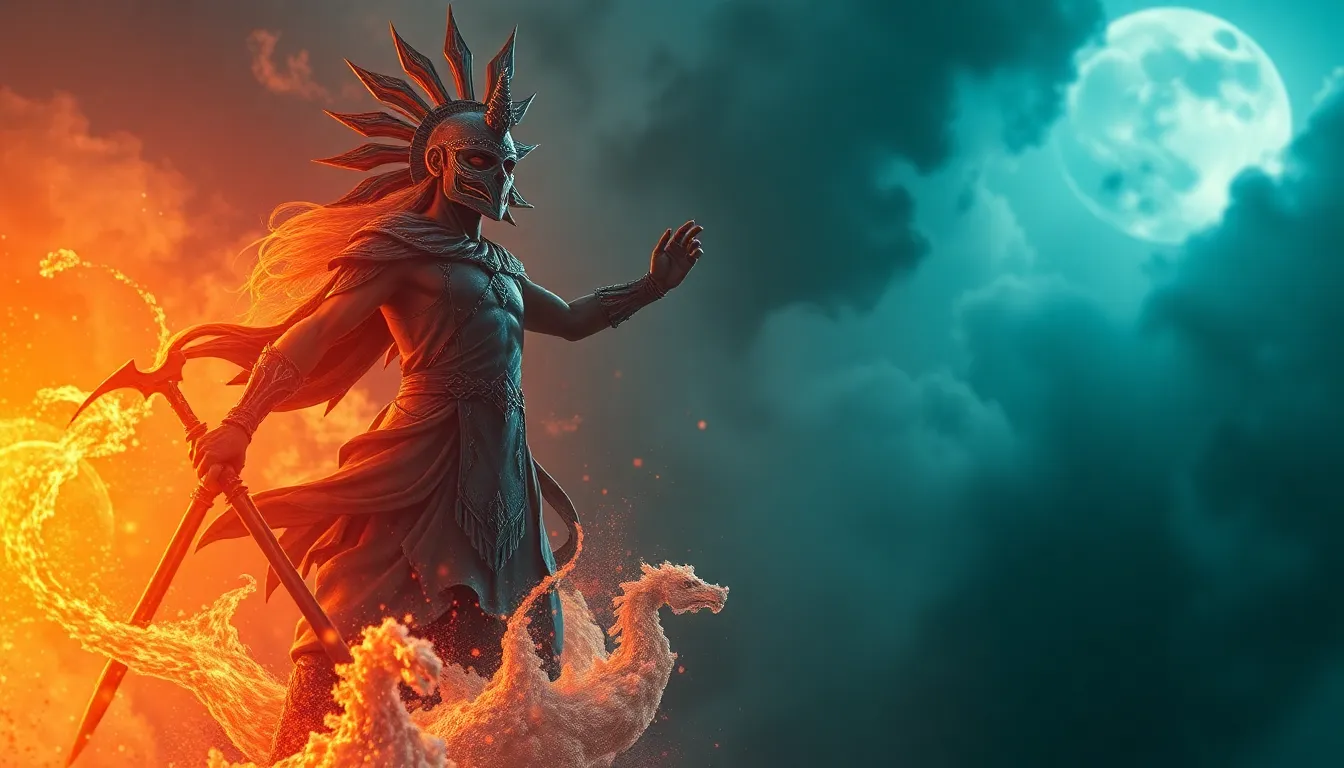The Great Mythological Showdown: Epic Battles Explored!
I. Introduction to Mythological Battles
Mythological battles are grand confrontations that often involve gods, heroes, and mythical creatures. These epic clashes serve as the crux of many myths, symbolizing the struggle between opposing forces, be it good vs. evil, order vs. chaos, or life vs. death.
The importance of these epic confrontations in mythology cannot be overstated. They reflect the values, fears, and aspirations of the cultures from which they originate. These narratives often embody moral lessons and serve to explain natural phenomena, life cycles, and societal norms.
Across various cultures, mythological battles have taken on unique forms, contributing to a rich tapestry of storytelling. From the Greek pantheon to the epic tales of the Indian subcontinent, each culture brings its own flavor to the concept of a mythological showdown.
II. The Role of Heroes and Gods in Mythology
Mythological heroes are often characterized by their extraordinary abilities, moral fortitude, and relatability. They embark on quests or face formidable foes, showcasing both their strengths and vulnerabilities. Key traits of these heroes include:
- Courage and bravery
- Supernatural gifts or abilities
- A tragic flaw or vulnerability
- Relatable human emotions
Divine intervention plays a crucial role in mythological battles, often determining the outcome of conflicts. Gods may choose sides, offer assistance, or impose challenges that heroes must overcome. This aspect raises questions about fate, free will, and the nature of divine influence.
Case studies of prominent figures like Hercules, Achilles, and Thor reveal the complexities of heroism:
- Hercules: Known for his strength and bravery, he faced the Twelve Labors, showcasing both his physical prowess and inner struggles.
- Achilles: A pivotal figure in the Trojan War, his vulnerability—his heel—symbolizes the flaws even the greatest heroes possess.
- Thor: The Norse god of thunder, he embodies both might and protection, often battling giants and serpents to defend Asgard.
III. Iconic Mythological Showdowns
Several iconic mythological showdowns have left a lasting impact on cultural narratives:
A. The Trojan War: Causes and Consequences
The Trojan War, immortalized in Homer’s “Iliad,” was ignited by the abduction of Helen. This war pitted the Greeks against the Trojans and featured legendary heroes like Achilles and Hector. The consequences were far-reaching, leading to the downfall of Troy and significant shifts in power dynamics in the ancient world.
B. The Battle of Ragnarok: Norse Apocalypse
Ragnarok is the prophesied apocalypse in Norse mythology, where gods like Odin and Thor face off against giants and monstrous beings. This battle signifies the end of the current world and the cyclical nature of existence, where destruction leads to rebirth.
C. The Titanomachy: Greek Gods vs. Titans
The Titanomachy represents the epic conflict between the Olympian gods led by Zeus and the Titans. This battle not only established the reign of the Olympians but also symbolizes the triumph of order over chaos.
IV. Cultural Perspectives on Epic Battles
Mythological battles vary significantly across cultures, offering diverse perspectives on conflict and heroism:
A. Western vs. Eastern Mythological Battles
In Western mythology, battles often focus on individual heroism and divine interventions, while Eastern mythology may emphasize collective efforts and moral lessons.
B. The significance of battles in various cultures
Different cultures view battles through unique lenses:
- Indian Mythology: The Mahabharata depicts the Kurukshetra War, emphasizing dharma (duty) and the moral dilemmas of war.
- African Mythology: Stories often illustrate the balance between nature and humanity, with battles reflecting communal struggles.
- Native American Mythology: Conflicts often symbolize the struggle against colonization and the fight for identity.
C. Comparative analysis of heroes and villains across different mythologies
Heroes and villains often share similarities across cultures. For instance, the hero’s journey is a common thread, while antagonists frequently embody chaos or moral corruption.
V. Symbolism and Themes in Mythological Battles
Mythological battles are rich in symbolism and recurring themes:
A. Good vs. Evil: A recurring theme
This classic struggle is evident in many narratives, where the forces of good strive to overcome evil. The outcomes often reflect moral lessons and the values of the society.
B. The quest for power and dominance
Many battles symbolize the quest for power, whether it be divine, political, or personal. These conflicts often explore the consequences of ambition.
C. Sacrifice and redemption in mythological narratives
Sacrifice is a recurring motif, often depicted as a path to redemption for heroes or a necessary act to restore balance in the world.
VI. Legendary Creatures and Their Impact on Battles
Mythical beasts play a significant role in enhancing the drama of mythological confrontations:
A. The role of mythical beasts
Creatures such as dragons, griffins, and chimera often serve as formidable adversaries or guardians in battles, adding layers of complexity to the narratives.
B. How creatures enhance the drama of confrontations
These beings often embody primal fears and challenges, making the hero’s victory even more significant.
C. Notable creatures in specific battles
For instance, the Minotaur in Theseus’ story symbolizes the chaos within the labyrinth of human emotion and conflict.
VII. The Evolution of Mythological Battles in Literature and Art
Mythological battles have been depicted in various forms of literature and art throughout history:
A. Depictions in ancient texts
Epic texts like the “Iliad” and the “Mahabharata” provide vivid descriptions of battles, capturing the emotional and physical stakes involved.
B. Influence of art movements on mythological representations
Art movements, from the Renaissance to Romanticism, have reinterpreted these battles, reflecting contemporary values and aesthetics.
C. Modern adaptations in film, literature, and video games
Today, mythological battles continue to inspire modern storytelling, with films and video games drawing upon these timeless narratives to engage new audiences.
VIII. Psychological and Philosophical Interpretations
Mythological battles offer profound insights into human nature:
A. What mythological battles reveal about human nature
These confrontations often mirror our internal struggles, fears, and aspirations, serving as allegories for personal and societal conflicts.
B. The psychological impact of conflict and resolution in myths
Conflicts in myths can lead to catharsis, allowing individuals to confront their own issues through the lens of storytelling.
C. Philosophical lessons drawn from epic confrontations
Philosophically, these battles often explore themes of justice, morality, and the human condition, prompting reflection on our choices and consequences.
IX. The Legacy of Mythological Battles in Popular Culture
The enduring legacy of mythological battles shapes contemporary storytelling:
A. How ancient battles inspire contemporary storytelling
Modern narratives often draw inspiration from ancient myths, reimagining battles to reflect current societal issues.
B. The resurgence of mythology in modern media
Films, TV shows, and literature frequently revisit mythological themes, making them accessible to a new generation of audiences.
C. Fan interpretations and their role in preserving mythological narratives
Fans engage with these stories, creating adaptations and interpretations that keep the mythological traditions alive.
X. Conclusion: The Enduring Fascination with Mythological Showdowns
The fascination with mythological battles endures across cultures and generations. These epic confrontations not only entertain but also provide deep insights into the human experience. By exploring the themes, characters, and narratives surrounding these battles, we gain



